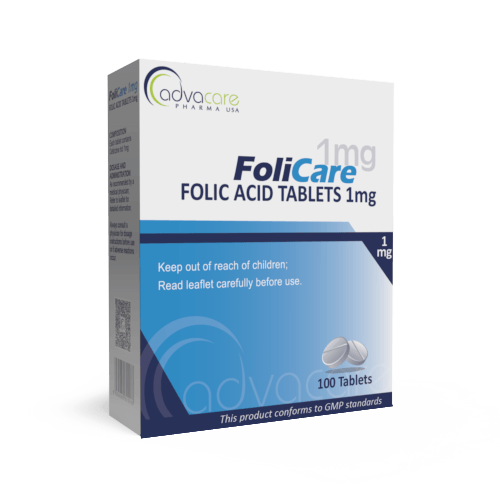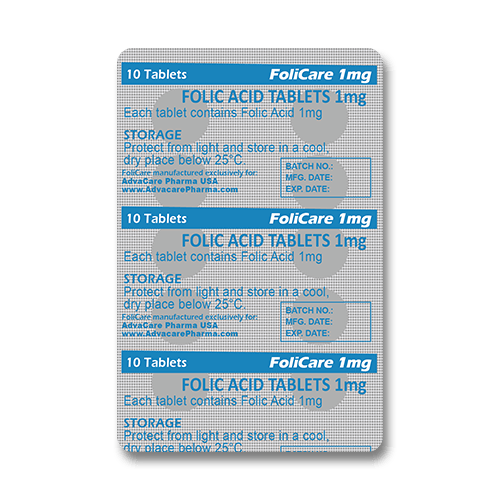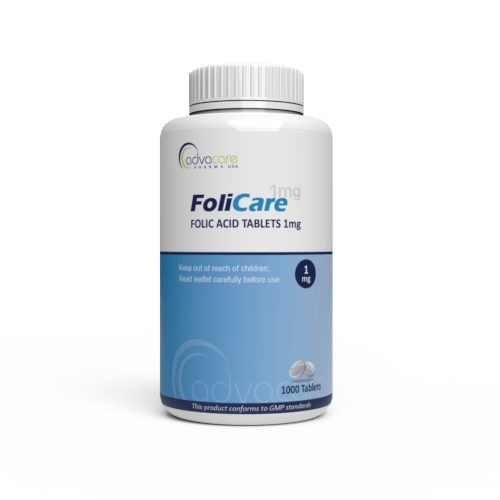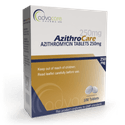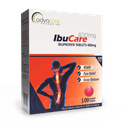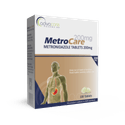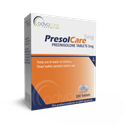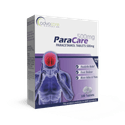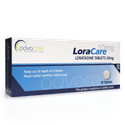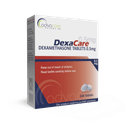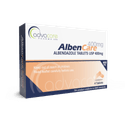- Home›
- Pharmaceuticals›
- Pharmaceutical Tablets›
- Folic Acid Tablets
Folic Acid Tablets
Dosage
Packaging
What is Folic Acid?
Active Ingredients: Folic Acid
Folic Acid Tablets are a supplement used to prevent and treat low blood levels of folate, as well as its complications, such as anemia and the inability of the bowel to properly absorb nutrients. It is also used for conditions associated with folate deficiency, including ulcerative colitis and kidney dialysis.
Folic acid is also used alongside other medicines in the treatment of pernicious anemia, a deficiency of vitamin B12 (cobalamin). Monotherapy with folic acid is not effective for this type of anemia, nor can folic acid treat anemia unrelated to vitamin B12 deficiency.
Folic acid is also known as vitamin B9 or folate. It is a water-soluble vitamin that is naturally found in foods like leafy greens, beans, whole-wheat products, and oranges. This vitamin aids in the production and maintenance of new cells in the body, and it is essential for regulating homocysteine levels within the blood. It also helps to prevent DNA changes that may lead to cancer. Folic acid is essential for supporting a healthy pregnancy, as it reduces the risk of spine or brain defects.
Oral administration of folic acid is the preferred treatment. Patients experiencing malabsorption typically are still able to absorb folic acid, and parenteral administration is not used except in certain situations, such as patients who receive enteral nutrition (enteral alimentation).
Folic acid is also available as a combination tablet with ferrous sulfate (iron). Ferrous Sulfate + Folic Acid Tablets are recommended for certain types of anemia that are related to both iron and vitamin B9 deficiency, as combination therapy can help improve a patient's adherence to their treatment plan.
AdvaCare is a GMP-certified producer of Folic Acid Tablets. This medication is manufactured in our factories in China, India, and the USA. We routinely inspect these facilities to ensure our products meet quality and safety standards.
Why are we a trusted Folic Acid manufacturer?
As a reputable Folic Acid manufacturer, we are dedicated to ensuring that GMP guidelines and standards strictly apply to the manufacture of our entire range of 200+ pharmaceutical treatments in tablet dosage form.
AdvaCare Pharma is an American pharmaceutical company committed to the manufacture of high-quality, affordable pharmaceuticals for a global market. The extensive international network that we partner with includes pharmaceutical distributors, hospitals, pharmacies, and a variety of other medical institutions. Our vision is to manufacture Folic Acid Tablets, and other quality-assured oral solid treatments, that get into the hands of those that need them most.
Uses
What is Folic Acid used for?
It is used to prevent folate deficiency and hyperhomocysteinemia. It may also be taken during pregnancy to prevent serious birth defects. Folic Acid is also taken to prevent complications from conditions commonly associated with folate deficiency, including ulcerative colitis, liver disease, alcoholism, and kidney dialysis.
How should Folic Acid Tablets be used?
This medication is intended to be taken orally. The tablets should be stored at room temperature (15-30ºC) when not in use. They should be stored away from environments with moisture or heat, as these factors quickly degrade the drug. Do not use this medication after the expiration date.
What dose should be taken and for how long?
Recommended dosage may vary based on different medical conditions.
Adults Recommended dosage may vary based on different medical conditions:
- For the treatment of folate deficiency associated with megaloblastic anemia, the usual dose is 1mg per day until hematologic correction. The maximum dosage is 5mg per day.
- For the treatment of tropical sprue, the usual dose is 3-5mg per day. The maximum dosage per day is 15mg.
- For dietary supplementation, the dose should be individualized for the patient, according to the recommended dietary allowances for folate.
- For the off-label prevention of neural tube defect prevention, the recommended dose is 0.4mg, taken once per day. Treatment should start at least 1 month before conception and continue through 12 weeks of gestation. In high-risk cases for neural tube defects, 4mg per day should be taken.
Children (1 - 11 months) For the treatment of folate deficiency associated with megaloblastic anemia, the usual dose is 30-45mcg, taken once per day. The starting dosage is 15mcg/kg per dose, given once per day until hematologic correction. The maximum dosage is 50mcg per day.
Children (1 - 10 years) For the treatment of folate deficiency associated with megaloblastic anemia, the usual dose is 0.1-0.4mg, taken once per day. The starting dosage is 1mg, given once per day until hematologic correction. The maximum dosage is 5mg per day. It should be noted that doses less than 1mg per day are rarely more effective, and alternative routes should be considered if malabsorption problems are present.
Children (11 years and older) For the treatment of folate deficiency associated with megaloblastic anemia, the usual dose is 0.4mg, taken once per day. The starting dosage is 1mg, given once per day until hematologic correction. The maximum dosage is 5mg per day. It should be noted that doses less than 1mg per day are rarely more effective, and alternative routes should be considered if malabsorption problems are present.
The dosage is based on medical condition, response to treatment, age, and weight.
Refer to a doctor or pharmacist for guidelines on dosage. Do not exceed what they advise.
Who can use Folic Acid?
Folic acid can be administered to adults and children (≥ 1 month), but special considerations are advised for patients who are:
Pregnant Folic acid is a Pregnancy Category A drug and is considered safe for use during pregnancy, with a recommended daily amount of 600mcg/day. Folic acid requirements are increased during pregnancy, and folic acid deficiency can cause fetal harm. Though there are no long-term studies to rule out an absolute risk to the fetus, there are also no reported studies of fetal harm. Supplementation is also recommended for infants with a low birth weight, or those who are breastfed by individuals with a folic acid deficiency, infection, or long-term diarrhea.
Nursing Folic acid is considered safe for use during breastfeeding, with a recommended daily amount of 500mcg/day. Folic acid requirements are increased during breastfeeding, and folic acid is known to be excreted in milk. There is no known or recorded risk of infant harm or milk production.
Pediatric Folic acid is essential for growth and development, and folic acid tablets are safe for administration to children with anemia or dietary insufficiencies.
Geriatric Studies suggest that excess supplementation of folic acid may be detrimental to the health of elderly patients. In elderly patients with elevated plasma total homocysteine concentrations, supplementation should be considered.
Other warnings
In patients with anticonvulsant therapy, alcoholism, hemolytic anemia, or chronic infection, it may be necessary to increase the daily maintenance level of folic acid.
Supplementation with folic acid may hide symptoms of a vitamin B12 deficiency. It is important for prescribers to rule out pernicious anemia before recommending treatment above 0.1mg per day, as folic acid will resolve hematology parameters without addressing underlying neurological issues caused by a deficiency of vitamin B12. Long-term supplementation of folic acid has been associated with decreased vitamin B12 serum levels.
Inaccurate results for low serum and red cell folate levels may occur if the patient has been treated with antibiotics, like tetracycline, which inhibit Lactobacillus casei proliferation.
No long-term studies have examined the effect of folic acid on fertility, carcinogenic risk, or mutagenic potential.
Side Effects
As with all pharmaceuticals, some unwanted effects can occur from the use of Folic Acid Tablets.
Common side effects include, but may not be limited to:
- nausea
- bloating
- gas
Serious, but rare, side effects may include:
- mood or behavior changes
- seizures
Folic acid is considered relatively nontoxic for humans. There have been rare reports of instances of allergic responses to the preparation of the supplement.
For a comprehensive understanding of all potential side effects, consult a medical professional.
If any symptoms persist or worsen, or you notice any other symptoms, please call your doctor immediately.
Precautions
Do NOT use Folic Acid Tablets if:
- You are allergic to any of the ingredients.
- You have had an angioplasty.
- You have a history of seizures.
Before treatment, consult your doctor regarding any medications you are taking to address potential drug interactions.Some drugs, such as anticonvulsants like phenytoin or phenobarbital, may decrease the efficacy of folic acid. Other medicines known to interact include methotrexate, nitrofurantoin, pyrimethamine, and tetracycline.
This medication may not be suitable for people with certain conditions such as epilepsy, liver disease, vitamin B12 deficiency, pernicious anemia, or cancer. Conditions that interfere with the absorption or utilization of folic acid, such as celiac disease and inflammatory bowel disease (IBD), may need special considerations. It is important to consult with a doctor if you have any health conditions.
References
Effect of 3-year folic acid supplementation on cognitive function in older adults in the FACIT trial: a randomised, double blind, controlled trial
Decreased folate levels and elevated homocysteine concentrations in the bloodstream are associated with poor cognitive performance, particularly in older adults. This FACIT trial evaluated the effects of folic acid on atherosclerosis markers in men and women aged 50 to 70 with elevated plasma total homocysteine and normal vitamin B12 levels, focusing on folic acid's impact on cognitive performance.
This randomized, double-blind, placebo-controlled study ran from November 1999 to December 2004. It included 818 participants who received either oral folic acid or placebo capsules for 3 years. The study assessed differences in memory, sensorimotor speed, complex speed, information processing speed, and word fluency between the two groups.
Participants taking folic acid showed a substantial increase in serum folate concentrations by 576% (95% CI 539 to 614) and a significant decrease in plasma total homocysteine concentrations by 26% (95% CI 24 to 28) compared to those taking a placebo.
Over the 3-year period, the folic acid group demonstrated significant improvements in memory (difference in Z scores 0.132, 95% CI 0.032 to 0.233), information processing speed (0.087, 95% CI 0.016 to 0.158), and sensorimotor speed (0.064, 95% CI -0.001 to 0.129) compared to the placebo group.
The study concluded that 3 years of folic acid supplementation can significantly improve cognitive function, which typically declines with age.

You might be interested in...
Why AdvaCare Pharma?
As an industry leader, we are aware of our responsibility to provide affordable and sustainable solutions to improve healthcare worldwide.
